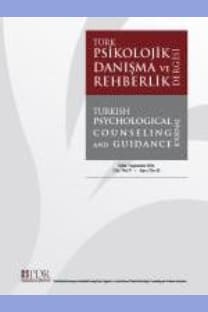Sosyal Provizyon Ölçeğinin Psikometrik Özellikleri:Geçerlik ve Güvenirlik Çalışması
-
Psychometric Characteristics of Social Provision Scale: Validity and Reliability Study
-,
___
- Bentler, P. (1990). Comparative fit indexes in structural models. Psychological Bulletin, 107, 238-246.
- Browne, M. W. ve Cudeck, R. (1993). Alternative ways of assessing model fit. In K. A. Byrne, B. M. (1989). A primer of LISREL: basic applications and programming for confirmatory factor ana- lytic models. New York: Springer-Verlag.
- Choenarom, C., Williams, R.A. ve Hagerty, B. M. (2005). The role of belonging and social support on stress and depression in individuals with de- pression, Archives of Psychiatric Nursing, 19 (1), 18-29.
- Cohen, S. ve Wills, T.A. (1985). Stres, social support, and the buffering hypothesis, Psychological Bulletin, 98 (2), 310-357.
- Cohen, S. (2004). Social relationships and health, American Psychologist, 676-684.
- Cutrona, C.E. ve Russell, D.W. (1987). The provision of social relationship and adaptation to stress. In W. H. Jones ve D. Perlman (ed.), Advances in Personal Relationships, vol., JAI Press, Inc., 37
- Demir, A. (1989). U.C.L.A. Yalnızlık Ölçeği’nin geçer- liği ve güvenirliği, Türk Psikoloji Dergisi, 7 (23), 14-18.
- Diener, E., Emmons, R. A., Larson, R. J. ve Griffin, S. (1985). The Satisfaction With Life Scale, Journal of Personality Assessment, 49, 71–75.
- Duru, E. (2005). Amerika’da lisansüstü öğrenim gören Türk öğrencilerinin yalnızlık düzeylerinin Türki- ye örneklemi ile karşılaştırılması ve yalnızlık dü- zeyinin bazı psiko sosyal değişkenler açısından incelenmesi, Eğitim ve Bilim Dergisi, 30, 16-26.
- Eker, D, Arkar, H. ve Yaldız, H. (2001). Çok boyutlu algılanan sosyal destek ölçeğinin gözden geçi- rilmiş formunun faktör yapısı, geçerlik ve güve- nirliği, Türk Psikiyatri Dergisi, 12 (1), 17-25.
- Eliot, T. R., Marmarosh, C. ve Pickelman, H. (1994). Negative affectivity, social support, and the prediction of depression and distress, Journal of Personality, 62 (3), 299-319.
- Fayers, P.M. ve Machin, D. (1998). Quality of live assessment in cilinical trials, methods and practice (Ed. Staquet, M, Hays, R. D. ve Fayers, P.M.), New York, Oxford University Press.
- Gelbal, S. (1994). P madde güçlük indeksi ile Rasch modelinin b parametresi ve bunlara dayalı yete- nek ölçüleri üzerine bir karşılaştırma, Yayınlan- mamış Doktora Tezi, Hacettepe Üniversitesi Sosyal Bilimler Enstitüsü, Ankara.
- Joreskog, K. ve Sorbom, D. (1993). LISREL 8 user’s guide. Lawrence Erlbaum Associates, Hillsdale, NJ.
- Kahna, H.J., Hessling, M. R. ve Russell, W. D. (2003). Social support, health, and well being among the elderly: what is the role of negative affectivity? Personality and Individual Differences, 35, 5-17.
- Kaya, A. (2005). Çocuklar için yalnızlık ölçeğinin Türk- çe formunun geçerlik ve güvenirlik çalışması, Eği- tim Araştırmaları Dergisi, 19, 220-237.
- Kuehner, T., C. ve Buerger, C. (2005). Determinants of subjective quality of life in depressed patients: The role of self- esteem, response styles, and social support, Journal of Affective Disorders, 86, 205-213.
- Lee, J. S., Koeske, G., F., ve Sales, E. (2004). Social support buffering of acculturative stress: A study of mental health symptoms among Korean inter- national students, International Journal of Inter- cultural Relations, 28, 399-414.
- Marsh, H. W. ve Hocevar, D. (1985). Application of confirmatory factor analysis to the study of self- concept: First-and higher-order factor models and their invariance across groups. Psychological Bulletin, 97, 562-582.
- Murray, A. S. (2004). Cross-Cultural reliability and validity of the Revised Conflict Tactics Scales: A study of university student dating couples in 17 nations, Cross- Cultural Research, 38 (4), 407- 432.
- Özdamar, K. (1997). Paket programlar ile istatistiksel veri analizi I, Anadolu Üniversitesi Yayınları, Eskişehir.
- Russell, D., Cutrona, C. E., Rose, J. ve Yurko, K. (1984). Social and emotional loneliness: An ex- amination of Weiss’ typology of loneliness, Journal of Personality and Social Psychology, 46 (6), 1313-1321.
- Simmons, C., Aysan, F., Thompson, D., Hamarat, E. ve Steele, D. (2002). Coping resource availability and level of perceived stress as predictors of life satisfaction in a cohort of Turkish college students, College Student Journal, 36 (1), 129
- Tommaso, D. E. ve Spinner, B. (1997). Social and emotional loneliness: A reexamination of Weiss’ typology of Loneliness, Personality and Individual Differences, 22(3),411-421.
- Weiss, R. (1974). The provision of social relationships. In Z. Rubin (ed.). Englewood, NJ: Pren- Hall, 17-26.
- Yıldırım, İ. (2004). Algılanan sosyal destek ölçeğinin revizyonu, Eğitim Araştırmaları Dergisi, 17, 221-236. Vol: III No: 27
- Turkish Psychological Counseling and Guidance Journal
- ISSN: 1302-1370
- Yayın Aralığı: 4
- Başlangıç: 1990
- Yayıncı: -
Kendini Belirleme (Güvengenlik) Ölçeği Geliştirme Çalışmaları
Nilüfer VOLTAN ACAR, Tuncay ÖĞRETMEN
Akran Danışmanlığı Nedir? Ne Değildir?
Psikolojik Danışma ve Kültürel Faktörler
Sosyal Provizyon Ölçeğinin Psikometrik Özellikleri:Geçerlik ve Güvenirlik Çalışması
Ezgi ÖZEKE KOCABAŞ, Füsun AKKÖK
Üniversite Öğrencilerinde Öznel ve Psikolojik İyi Olmanın Yordayıcılarının İncelenmesi
Mesleki Olgunluk ve Mesleki Kararsızlığın Akılcı Olmayan İnançlarla İlişkisi
Zeynep HAMAMCI, Aysel ESEN ÇOBAN
Grupla Psikolojik Danışmada Bir Profesyonel ve Bir Birey Olarak Lider
